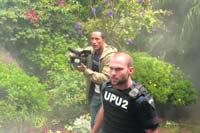Southland Tales and Youth Without Youth

Now that Donnie Darko's popularity has reached beyond its cult tag, it's easy to forget that with its wormholes, time travel and talking rabbits, it caused a lot of head scratching upon release back in 2001. Well, Donnie's writer/director Richard Kelly has gone one (well, twenty) better with Southland Tales.
A dense plot that makes the Day Watch trilogy look like P.S I Love You, the ‘story' is set in Los Angeles, 4 July, 2008 and swirls around Boxer Santaros (Dwayne ‘The Rock' Johnson), an amnesiac film star who has written a script about the apocalypse with porn star Krysta Now (Sarah Michelle Gellar), a German firm convinced they can generate power from seawater, Justin Timberlake's unhinged Iraq vet and Seann William Scott's police officer, who holds the key to a vast government conspiracy that involves a Marxist underground sect. At 160 mins, Southland Tales feels like a first draft, scribbled notes and all, as a myriad of ideas come gushing in at every angle. It might be the most ambitious and convoluted film of the last decade and there might be a good film somewhere amongst the debris – it's trapped somewhere in Kelly's mind, however. Stay tuned for a director's cut.
Just as impenetrable as Southland Tales is Francis Ford Coppola's Youth Without Youth. Adapted from Mircea Eliade's novella, the WWII-set story sees Tim Roth play a 70-year-old Romanian linguistics scholar Dominic Matei who one day is struck by lightening. Upon recovery, Dominic regresses in age and masters languages he never knew. Assuming a new identity, he leaves for Switzerland where he meets the beautiful Veronica (Alexandra Maria Lara). Veronica, however, is also struck by lightening and takes on the identity of 7th century Raffini; her age accelerates at a colossal rate and Dominic reckons that their lives are interconnected.
For Coppola, attempting to address life, the universe and everything was a tough task - especially when he is tied by budget constraints and the fact that he hasn't made a decent film since 1988's Tucker. Where as Kelly kept any oddball directing techniques to a minimum, Coppola's is just as whacky as his plot: cutting from colour to black and white, from cold colours to warm, from Dutch angles to upside-down shots and split screens, the film is jarring in every way possible.
GAVIN BURKE
